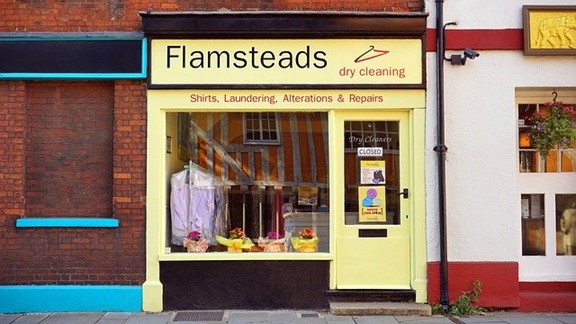Voices from the Sylff Community
Jun 1, 2021
When It Comes to Sustaining Community Relationships, Small Businesses Are Not Small
In this thought-provoking essay, 2002 Sylff fellow Patrick Kabanda advocates for small businesses like local dry cleaners. These mom-and-pop establishments play an outsized role in the community, says Kabanda, contributing to the well-being and cohesion of people and neighborhoods. But public relief programs have been less than successful at keeping these businesses afloat in the time of COVID-19.
* * *

Small businesses such as dry cleaners keep our communities healthy and sustain the harmony of our public life. But unfortunately, many of them have had to close down due to the COVID-19 pandemic.
Photo by Mikes-Photography from Pixabay
Among the many valuable lessons I learned as a music student, besides analyzing how the harmony of meaningful relationships works, was that the dry cleaning expenses for my concert clothing could be tax deductible; by the way, the tax code for artists, at least in the United States, can be complicated to a degree more than many of us would care to know.[1] And so, although it was customary in my native Uganda to iron clothes personally, knowing that my dry cleaning could be tax deductible has, in a way, always been an incentive to visit the dry cleaners—never mind that I’m not that religious about keeping the receipts.
When I moved to the Washington, DC area in 2014 (I never thought I’d stay this long), I kept my routine: one of the first places I searched was where I could do my dry cleaning. As I quickly discovered, from state to state, city to city, town to town, many such small businesses are usually family owned and operated by immigrants. As an immigrant myself, I often strike up conversations with attendants, and to my delight, they often reciprocate, as they are curious to know how I got into music. In terms of social capital, we get to bond in a way that otherwise wouldn’t have happened.
My most recent dry cleaner got to know me so well that whenever I showed up to pick up my clothes, she wouldn’t even need to check my phone number or my name. She would simply press a green buzzer on a machine that appears as if it’s supporting a thick forest of apparel, and my clothes would appear as if by magic from the thicket, well pressed, looking and smelling new. And if there were no other customers in line we confabulated for a while before I paid and left.
Then came COVID.
When the pandemic hit the globe, for months I never needed to go to my dry cleaner, nor did I give it much thought. But when things started to slowly reopen, I thought, “Well, some of those shirts with sweat from Zoom meetings could use a good clean.” So I went to my dry cleaner in early December 2020. But instead of being excited to see my friend, when our eyes met, we both were awash in sadness. For there was a sign in big red letters in front of her shop announcing that the business was closing.
As I tried to make sense of this, my friend said that the landlord couldn’t afford to keep reducing the rent, and with all the customers they’d lost during the pandemic, the dry cleaners had no choice but to close. What about those billions from the Paycheck Protection Program, which, as the pandemic raged, were supposed to keep millions of small businesses afloat?[2] It’s complicated.
There’s word that dozens of large restaurant chains, thanks to the restaurant industry’s lobbying efforts, somehow became eligible for relief that was intended for small businesses. There’s word that the money wasn’t shared evenly, because, as many had suspected from the very beginning, the biggest sums went to a tiny minority of the businesses in need; that is, “a mere 1 percent of the program’s 5.2 million borrowers” seeking over $1 million “received more than a quarter of the $523 billion disbursed.”[3] And there’s word that the haphazard nature in which the rules were poorly designed, coupled with the program’s hasty rollout, was an invitation to fraudsters; indeed, by the end of 2020, the US Justice Department had made “at least 41 criminal complaints in federal court against nearly 60 people, who collectively took $62 million from the Paycheck Protection Program,” as the American journalist Stacy Cowley has reported.[4]
After absorbing all that, I asked my dry cleaner if I could interview her for this story. She was reluctant to talk, because she feared her English wasn’t good enough, not to mention that she was concerned for her privacy. But eventually she agreed on the condition that I wouldn’t use her real name or the name and location of the shop. And so, let’s call her Anna, and her shop Da Capo Dry Cleaners.
Anna, a petite soft-spoken woman who is married and has a son in his late thirties, came to the United States from South Korea in the early 1980s. She got into the dry-cleaning business a few years thereafter. She has worked at Da Capo Dry Cleaners for more than 12 years. Although there’s an older lady who would occasionally come in on Saturdays for about four to five hours to help, Anna worked alone most of the time, all day long. “Nobody bothers me,” said Anna, who rarely, if ever, took a sick day off. It’s happy, responsible work, she added. If items were cleaned off-site, she would check and fix anything that looked amiss; for what kept her happy was to give a customer something nice. “Some people don’t work like me, because they don’t know how I do it,” she said. “I’m a very experienced, long-time cleaner, and if I see something bad, oh my gosh! I don’t know, I have to fix something bad, I have to fix.”
It’s little wonder that when asked what she is going to miss the most, she said it was the people, her customers. “How are you going to miss them,” I asked. “Ha ha ha,” her face beamed. “You know,” she added, as she recounted recent gifts from her customers, and I paraphrase: Some people have brought me cake, some people have given me money—she pulled out a crisp twenty-dollar bill to show me—some person, a candle and chocolate; one person brought a flower, another person yesterday gave me fifty dollars. But the gifts aside, she concluded that the interactions with her customers and their compliments for her meticulous service were irreplaceable.
In terms of public policy, what has been much debated is the need to save these mom-and-pops for the commerce and jobs they sustain. Rightly so. Nevertheless, although these businesses are small, what’s missing is the value of the important relationships they foster in our communities. In the West, where loneliness is taking such a toll to the point that in 2018 the UK government appointed a Minister for Loneliness,[5] there’s especially a need to consider how the closure of small businesses has affected communities since COVID swept the globe.
It’s encouraging that discussions are being held[6] on how the pandemic is impacting mental health.[7] But if we understand that—from health and community to jobs and relationships—these issues are interconnected, helping small businesses is bigger than helping them weather the worst in terms of commerce and job losses. Their contribution to our well-being could mean that they should also be supported on the basis of how they glue neighborhoods together, how they keep communities healthy, and how they sustain the harmony of our public life. That, in a way, could help open up resources and collaborations between and within governmental and nongovernmental agencies to deal with a wide range of challenges, including speedily crafting policies that are less susceptible to exploitation and fraud. It could also encourage continuous “systems thinking,”[8] rigorous interdisciplinary research, and ample cross-cultural analysis.
In New York, where I studied music at Juilliard, a New York Times editorial titled “They Offered Us Comfort and Normalcy. Now They Need Our Help.” concluded as follows: “In the darkest days of the pandemic this year, it was New York’s small businesses—its coffee shops and restaurants, groceries and bakeries—that remained open, serving up comfort and normalcy to millions who sorely needed them. Now they need our help in return.”[9]
Many small businesses across the world—in New York City alone, over 230,000 of them employ roughly 1.3 million people[10]—undoubtedly need our help now. How cities, states, and countries are going to successfully do this will certainly vary from place to place. That help, as in the case of New York, can run from “giving them direct federal aid and access to inexpensive capital” to cutting “onerous red tape” that complicates their work.[11] Also, subsidizing rent for struggling mom-and-pops until they’re back on their feet could be considered from country to country.
As Ray Oldenburg writes in his book The Great Good Place, “third places”—cafés, hair salons, dry cleaners, and the like—are “essential for the health both of our communities and ourselves.”[12] Once we take that argument to heart, we’re more likely to see small businesses not just as businesses, but also as part and parcel of the well-being of our society, especially during a global pandemic. Anna and I couldn’t agree more.
[1] Amy Sohn, “How the Tax Code Hurts Artists,” New York Times, April 1, 2015, https://www.nytimes.com/2015/04/01/opinion/how-the-tax-code-hurts-artists.html.
[2] Stacy Cowley and Ella Koeze, “1 Percent of P.P.P. Borrowers Got over One-Quarter of the Loan Money,” New York Times, December 2, 2020, updated February 1, 2021, https://www.nytimes.com/2020/12/02/business/paycheck-protection-program-coronavirus.html.
[3] Cowley and Koeze.
[4] Stacy Cowley, “Spotting $62 Million in Alleged P.P.P. Fraud Was the Easy Part,” New York Times, August 28, 2020, updated December 2, 2020, https://www.nytimes.com/2020/08/28/business/ppp-small-business-fraud-coronavirus.html.
[5] Ceylan Yeginsu, “U.K. Appoints a Minister for Loneliness,” New York Times, January 17, 2018,
https://www.nytimes.com/2018/01/17/world/europe/uk-britain-loneliness.html; Grace Birnstengel, “What Has the U.K.’s Minister of Loneliness Done to Date?” Next Avenue, January 17, 2020, https://www.nextavenue.org/uk-minister-of-loneliness/.
[6] Kira M. Newman, “Seven Ways the Pandemic Is Affecting Our Mental Health,” Greater Good Magazine, August 11, 2020, https://greatergood.berkeley.edu/article/item/seven_ways_the_pandemic_is_affecting_our_mental_health.
[7] Bilal Javed et al., “The Coronavirus (COVID‐19) Pandemic’s Impact on Mental Health,” International Journal of Health Planning and Management 35, no. 5 (2020): 993–96, https://doi.org/10.1002/hpm.3008.
[8] Zeynep Tufekci, “Using ‘Systems Thinking’ to Make Sense of the World, from Pandemics to Politics,” interview by Meghna Chakrabarti, On Point, WBUR 90.9 FM, February 25, 2021, https://www.wbur.org/onpoint/2021/02/25/zeynep-systems-thinking-to-make-sense-of-the-world-from-pandemics-to-politics.
[9] The Editorial Board, “They Offered Us Comfort and Normalcy. Now They Need Our Help.,” New York Times, December 5, 2020, https://www.nytimes.com/2020/12/05/opinion/nyc-small-businesses-covid.html.
[10] The Editorial Board; The Partnership for New York City, “‘NYC Small Business Resource Network’ Launch,” September 30, 2020, https://pfnyc.org/news/nyc-small-business-resource-network-launch/.
[11] The Editorial Board.
[12] Ray Oldenburg, The Great Good Place: Cafés, Coffee Shops, Bookstores, Bars, Hair Salons, and Other Hangouts at the Heart of a Community (Cambridge, MA: Da Capo Press, 1999), fourth cover.
